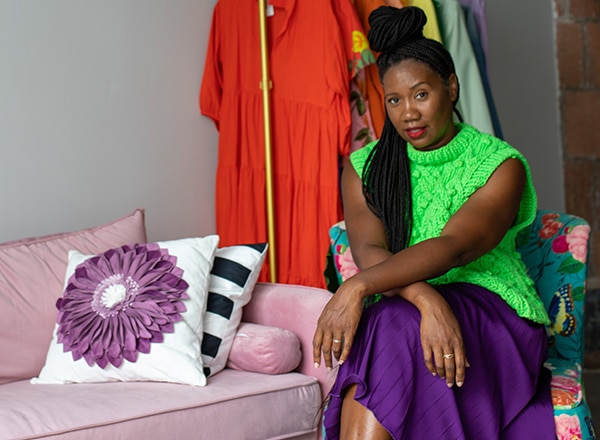“A healthy relationship is one in which neither person silences or betrays themselves to please the other, and each person is able to express freely their feelings and perspective.” — Koya Webb
Setting healthy boundaries is essential for harmonious personal and business relationships.
Healthy boundaries are empowering, liberating, and can help maintain your self-esteem and confidence.
Unhealthy boundaries cause emotional pain that can lead to dependency, anxiety, depression, and even stress-induced physical illness.
Healthy boundaries are guidelines or limits that a person creates for themselves to promote optimal health and vitality. Boundaries also set out how the person will respond if those limits are challenged.
In celebration of Black History Month, and in partnership with QuickBooks, I want to share with you the importance of setting healthy boundaries. Setting boundaries, both professionally and personally, is vital to ensure a happy and healthy life.
Why is it important to set boundaries?
- To practice self-care and self-respect
- To communicate your needs in a relationship
- To avoid burnout
- To establish a sense of identity
- To make time and space for positive interactions
- To set limits in a relationship in a way that is healthy
- To manage your personal space, energy, and mental health
Here are some important things to note when establishing healthy boundaries:
- Communicate your boundaries at the start of any new relationship.
- Make it clear to the person who has violated your boundary by communicating as soon as possible and politely. Don’t let it build up. The longer you wait, the harder it gets.
- Understand that you’re in control of the people you let into and out of your life and when.
So what do healthy boundaries actually look like? Here are my top 5 that have helped me cultivate a harmonious work/life balance.
1. I say “no” or “let me think about it” when a request doesn’t resonate with me.
As a business owner, I see new opportunities arise all the time. It’s easy to get overwhelmed by the never-ending amount of requests and feel committed to saying yes from fear of missing out or disappointing someone. However, your time and resources are sacred, and you’ll notice a significant increase in energy levels when you’re more mindful of what you’re committing to. To make the decision-making process easier, it’s important to get clear on your “why” and map out your core values. Try asking yourself before agreeing to a new opportunity: Does this opportunity align with what I want to represent and support?
This will help keep all actions in your business aligned and also protect your time and energy from getting depleted. Remember that even if money gets in the way, think of your “no” as a long-term investment in building your brand. People will start to respect your selectivity, and you’ll build a more loyal community that aligns with your core values.
2. I schedule self-care every morning from 6–10 AM. Yes, that’s 4 hours to fill my cup so I can give from the overflow.
This is a non-negotiable daily habit and part of my daily rituals. I always make sure to schedule it first thing in the morning so nothing gets in the way. I schedule any work-related meetings or tasks after this time. I communicate this clearly to my team. If anyone schedules something within this time, I remind them of my boundaries and ask them to reschedule during my work hours of 11–5 PM. Doing this will help you, too, to make sure you start the day as your best self before letting any of the outside world in. Think of it as a daily meeting with yourself that can’t be rescheduled. If you have a busy personal life, get up earlier than your family, or find 30 minutes in your day where you can recharge. Usually, you’ll find this easier in the morning or nighttime. You may start out thinking of this as “optional self-care time.” But when you begin to think of this time as “non-negotiable time to recharge,” you’ll be less likely to skip it.
3. I stop working at 5 PM Monday through Friday. 5–10 PM is my family and friends time.
As a wellness entrepreneur working from home, it’s crucial to have a cut-off time; otherwise, you can find yourself working all day. Before my healthy boundaries, my hours were 8 AM to 8 PM, and I still never completed my to-do list. Make sure you communicate this time to your team as well and make it a habit to always stop work at the same time. A helpful way to make the transition is to have a dedicated work and relaxation area to help your mind make the shift.
4. I rarely schedule work on the weekends. This is my time to rest, relax, and recover.
It’s important to recharge and reflect on the past week before jumping right into a new one. If you really have to sneak in some work, I recommend having blocked out times. But always prioritize your rest first and work second. The more rest and recovery you give yourself, the more energy you’ll have for the next week.
5. When someone asks me to do something outside of my boundaries, I let them know about my healthy boundaries and why I have them.
When it comes to setting healthy boundaries, communication is key, whether it’s professional or personal. I recommend you make it clear to the other person what your needs and intentions are behind your boundaries. Don’t be afraid to have a private conversation and make it clear how crossing this boundary is affecting you and the changes you would like to see.
I’ve created an example you can edit and make your own to help with this conversation.
Hi, (person). I’ve noticed (boundary being violated) and it makes me feel (how you feel). Do you think we could (ideal scenario) so that (explain the ideal feeling you and they would have after)?
When you realize you need to set a boundary, do it clearly, respectfully, and in as few words as possible. You don’t need to justify your boundary or apologize for setting it.
You are also not responsible for the other person’s reaction to the boundary you’re setting. You are only responsible for communicating your boundary in a respectful way. If it upsets them, know it’s their problem to resolve within themselves.
At first, you might feel selfish, guilty, or even embarrassed when you set a boundary. Do it anyway, and remind yourself you have a right to self-care. Setting boundaries takes practice and determination. Don’t let anxiety, fear, or guilt prevent you from taking care of yourself. When you feel anger or resentment or find yourself whining or complaining, you probably need to set a boundary.
Listen to your intuition. Determine what you need to do or say and communicate it clearly. Learning to set healthy boundaries takes time. It’s a process. Develop a support system of people who respect your right to set boundaries, and allow those who don’t to eliminate themselves from your inner circle.













